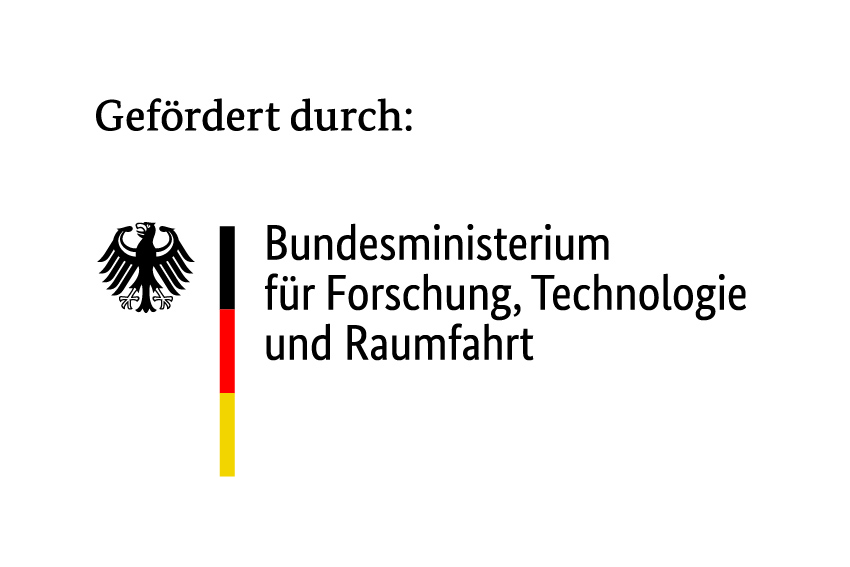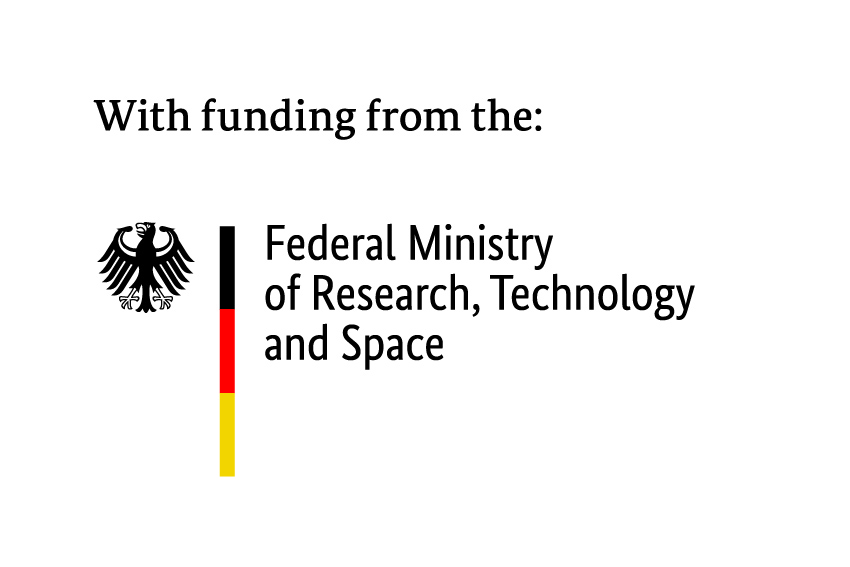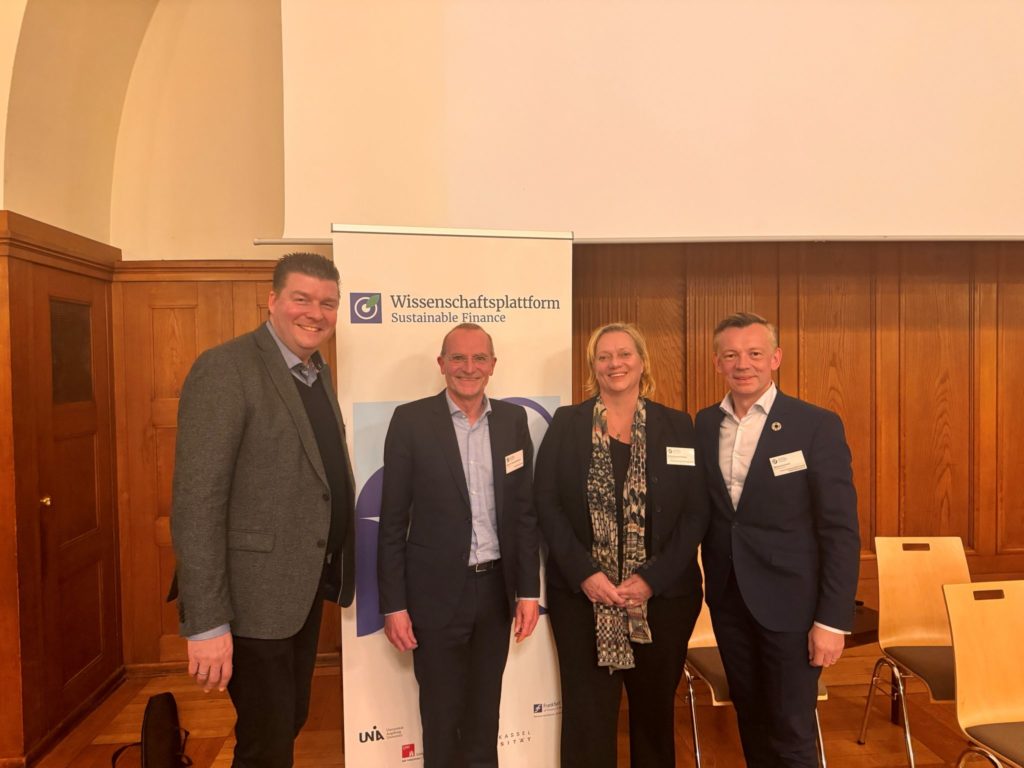Review of the conference on November 14, 2023 in Hamburg
Things are moving at the sustainable finance hub of Hamburg. The 140 or so conference participants who made their way to the Hamburg Chamber of Crafts on November 14, 2023 probably came to a similar conclusion. The conference “Sustainability Reporting and Impact: Regulation, Measurement, Effect” was organized by the Sustainable Finance Research Group of the University of Hamburg and held in cooperation with the Sustainable Finance Science Platform, the joint project Sustainable Finance & Climate Protection and the Finance City Hamburg initiative. The event was part of the multi-week program of the 7th Sustainable Finance Summit of the Green and Sustainable Finance Cluster Germany (GSFCG).
“Our goal is relevant research for stakeholders in politics and practice,” emphasized Alexander Bassen (University of Hamburg) as representative of the host science in his welcoming statement. Fittingly, GSCFG Managing Director and Sustainable Finance Summit patron Michael Schmidt announced in his welcoming address that he intended to work even more closely with the Sustainable Finance Science Platform in future. The cooperation between the cluster and the science platform was recently formalized in a memorandum of understanding and aims to further strengthen the theory-practice bridge in the field of sustainable finance.
Impact topic is making progress
Despite progress, Timo Busch (University of Hamburg) still sees a great need for discussion on the topic of the impact of sustainable investment products. In the first academic presentation of the day, he used various examples to show that a uniform understanding of the definition of different impact categories has become established. The decisive criterion here is whether an investment has a direct impact on sustainability (“investor impact”). If this is the case, it is referred to as an impact-generating investment; if not, the term “impact-aligned” is used. Even the European Securities and Markets Authority (ESMA) refers to this differentiation with the terminology “buying impact” and “creating impact”. However, there is still a lack of uniform standards for the quantitative measurement of impact in many sustainability dimensions, for example in the area of biodiversity. Busch has summarized the status of his observations together with fellow researchers in a white paper.
Another way for investors to improve the sustainability performance of their portfolio companies is through coordinated engagement measures. In his presentation, Michael Schmidt (GSFCG) discussed various possibilities for collaborative engagement and showed that this can also take place beyond shareholder meetings and ideally leads to continuous dialog at different company levels.
The last two input presentations of the morning focused on expectations. Christian Klein (University of Kassel) reported on findings from his research into the sustainable investment behavior of private customers. Among other things, he observed that the majority of retail investors who invest in sustainable financial products assume that their decision to invest in a sustainable financial product will make a measurable contribution to achieving sustainability goals (“impact generating”). To conclude the first part of the event, Marcus Küster (HAUCK AUFHÄUSER LAMPE PRIVATBANK) provided a picture of sentiment from the customer segment of foundations and high net worth individuals.
New requirements for disclosure and transparency
After the first part of the event focused on the sustainability impact of various asset classes and the associated expectations of different investor groups, the focus after the lunch break was on disclosure and reporting requirements for companies in the financial and real economy. Banks in particular are currently facing the challenge of having to comply with various regulatory changes at the same time. In his keynote speech, Torsten Jäger (Association of German Banks) emphasized that in order to make the hoped-for contribution to a successful transformation, the regulatory framework, which is largely set at EU level, must meet the criterion of coherence.
Banks could soon benefit from far better availability of standardized sustainability data. As part of the Corporate Sustainability Reporting Directive (CSRD), more and more companies operating in the EU are gradually being obliged to collect and disclose relevant data in accordance with the European Sustainability Reporting Standards (ESRS). With Kerstin Lopatta (University of Hamburg), Simon Braaksma (Royal Phillips N.V.) and Allesandro d’Eri (ESMA), three EFRAG members directly involved in the conception of the standards discussed the potential of the new EU framework. All three were optimistic that the standards – despite the materiality analysis being perceived in many places as a considerable weakening – can develop the necessary clout.
Many small and medium-sized enterprises (SMEs) are already affected by the new EU regulations, even if they are not yet obliged to report. Supply chains and customer relationships mean that many SMEs already have to collect and provide sustainability data. Even if this represents a considerable challenge, Kati Beiersdorf (DRSC), Michaela Ölschläger (Hamburg Chamber of Commerce), Alexander Bassen (University of Hamburg) and Teresa Haller-Mangold (Nexperia) pointed out in the second discussion round of the afternoon that addressing the topic of sustainability also opens up opportunities for companies. Despite the tense economic situation, companies that have addressed the issue of sustainability at an early stage are now able to position themselves successfully in a competitive environment with increased regulatory requirements.
Investment market: What information really helps?
After the question of how to generate sustainability data was examined from a variety of perspectives, the final panel discussion, moderated by Jan Schulte (Tagesspiegel Background Sustainable Finance), focused on the question of what benefits different investor groups could derive from increased transparency. Following impulse statements by the four panelists Georg Schürmann (Triodos Bank), Jegor Tokarevich (Substance Over Form), Roland Kölsch (QNG/FNG-Siegel) and Nahid Ghulami (MSCI), it quickly became clear that the topic of sustainability plays an important role in the various market segments, but that it is still difficult to create a comprehensive and objective basis for evaluation. In the end, the participants agreed that the claim of having a perfect information base would be difficult to fulfill and that in many cases a more in-depth examination of the valuation methodology would be necessary. This would be easier for institutional investors as they have access to the relevant resources and expertise.
In his closing remarks, Hamburg’s Senator for Finance Andreas Dressel correctly anticipated that the redirection of private capital flows could soon become even more important because the Federal Constitutional Court has declared the reclassification of coronavirus loans to the Climate and Transformation Fund to be unconstitutional. He praised the development of sustainable finance in Hamburg and hopes that even more experts will soon be supporting the transformation in the Hanseatic city on the ground. Municipal companies, such as the Hamburg Transport Authority, also face the challenge of mobilizing the capital required for the transition to climate neutrality. In his parting words, a very satisfied host Alexander Bassen thanked all the speakers and co-organizers, the audience, who were eager to discuss, and especially Signal Iduna and Finance City Hamburg for their financial support of the event. The discussions and presentations showed in many places that science can still make a valuable contribution as a companion to the transition – especially when it enters into a regular exchange with practice and politics.
List of input presentations and panel discussions
- Prof. Dr. Timo Busch (University of Hamburg): “Impact Investments: What we (don’t) know”
- Michael Schmidt (Green and Sustainable Finance Cluster): “How do we promote engagement?”
- Prof. Dr. Christian Klein (University of Kassel): “What impact do private investors expect?”
- Marcus Küster (HAUCK AUFHÄUSER LAMPE PRIVATBANK): “Impact expectations of foundations and HNWIs”
- Torsten Jäger (Association of German Banks): “The transformation via the financial sector – banks caught between ambition and regulation”
- Panel discussion: EU perspectives on sustainability reporting
- Prof. Dr. Kerstin Lopatta (EFRAG SRB, Vice Chair, University of Hamburg)
- Simon Braaksma (EFRAG, Senior Director, Royal Philips N.V.)
- Alessandro d’Eri, PhD (EFRAG, Senior Policy Officer, ESMA)
Moderation: Prof. Dr. Alexander Bassen (University of Hamburg)
- Panel discussion: How does sustainability come to SMEs?
- Dr. Kati Beiersdorf (DRSC)
- Dr. Michaela Ölschläger (Hamburg Chamber of Commerce)
- Prof. Dr. Alexander Bassen (University of Hamburg)
- Dr. Teresa Haller-Mangold (nexperia)
Moderation: Prof. Dr. Laura Edinger-Schons (University of Hamburg)
- Panel discussion & 5-minute statements: More transparency and consumer information in the investment market
- Georg Schürmann (Triodos Bank): “The ESG scale of the SFB”
- Yegor Tokarevich (Substance Over Form): “EETs for alternative investments”
- Roland Kölsch (FNG Seal): “The world of SRI labels”
- Nahid Ghulami (MSCI): “ESG ratings and screenings”
Moderation: Jan Schulte (Tagesspiegel Background Sustainable Finance)
- Dr. Andreas Dressel (Hamburg Senator for Finance, Hamburg Finance Authority): Closing remarks
Zu den Veranstaltungsdokumenten
- Prof. Dr. Timo Busch: "Impact Investments: Was wir (nicht) wissen"
- Michael Schmidt: "Wie bringen wir Engagement voran?"
- Prof. Dr. Christian Klein: "Welche Wirkung der Privatanleger erwartet?"
- Marcus Küster: "Impact Erwartungen von Stiftungen und HNWIs"
- Torsten Jäger: "Die Transformation über den Finanzsektor"
- Georg Schürmann: "Die ESG-Skala des SFB"
- Jegor Tokarevich: "EETs für alternative Investments"
- Roland Kölsch: "Die Welt der SRI-Labels"
- Nahid Ghulami: "ESG-Ratings und -Screenings"


